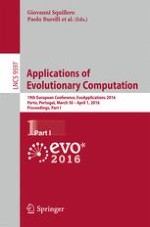2016 | OriginalPaper | Buchkapitel
The Story of Their Lives: Massive Procedural Generation of Heroes’ Journeys Using Evolved Agent-Based Models and Logical Reasoning
verfasst von : Rubén H. García-Ortega, Pablo García-Sánchez, Juan J. Merelo, Aránzazu San-Ginés, Ángel Fernández-Cabezas
Erschienen in: Applications of Evolutionary Computation
Aktivieren Sie unsere intelligente Suche, um passende Fachinhalte oder Patente zu finden.
Wählen Sie Textabschnitte aus um mit Künstlicher Intelligenz passenden Patente zu finden. powered by
Markieren Sie Textabschnitte, um KI-gestützt weitere passende Inhalte zu finden. powered by
